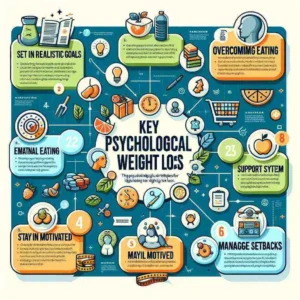Psychological Strategies for Effective Weight Loss
Embarking on a weight loss journey is often perceived as a physical challenge, primarily focused on diet and exercise. However, the role of the mind in this process is just as critical, if not more so. The “Psychological Strategies for Effective Weight Loss” concept delves into losing weight’s mental and emotional facets.
It acknowledges that our thoughts, feelings, and behaviours are deeply intertwined with our eating habits and physical health. This approach moves beyond the simplistic ‘calories in, calories out’ model, offering a more holistic and sustainable path to weight loss.
Understanding and leveraging psychological strategies can lead to profound and lasting changes. These strategies are crucial tools in one’s weight loss arsenal, from cultivating a growth mindset to learning how to set realistic goals, manage emotional eating, and build a supportive environment. They help address the root causes of weight-related issues, leading to healthier habits and better overall well-being.
This comprehensive guide thoroughly explores these psychological strategies, outlining their benefits, potential challenges, and frequently asked questions. The aim is to provide a well-rounded perspective on how integrating mental and emotional wellness techniques can significantly enhance the effectiveness of weight loss efforts.

Sarah’s Transformation: Beyond Diet and Exercise
Meet Sarah, a 35-year-old marketing executive and devoted mother of two. For years, Sarah’s life was a rollercoaster of weight fluctuations. Each new diet, glowing with the promise of quick fixes, turned out to be a fleeting mirage. The real wake-up call came during a routine doctor’s visit. Her doctor’s concern over her rising blood pressure and cholesterol levels was a stark warning: it was time for a real change.
But this journey was different. Sarah realized that to transform her health truly, she needed to delve deeper into calorie counts and gym routines. It was about addressing the psychological underpinnings of her weight struggle. She embarked on a mental and emotional self-discovery journey, shifting her focus from weight loss to overall health and well-being.
Sarah began with her mindset. She transformed her approach to weight loss from a short-term goal of losing weight to a long-term commitment to health and vitality for herself and her family. She set realistic and manageable goals, like incorporating a daily 30-minute walk and opting for fruits instead of desserts. But the most significant change was her confrontation with emotional eating. Through journaling, Sarah began unravelling the complex emotions tied to her eating habits. This self-reflection was pivotal in managing her triggers and reshaping her relationship with food.
As days turned into weeks and weeks into months, the changes in Sarah were undeniable. The transformation transcended the physical; she radiated a newfound confidence and vitality. Her journey is a testament to the power of addressing the psychological dimensions of weight loss.
Sarah’s story mirrors the experiences of many who have ventured on this path. It underscores a crucial realization: effective weight loss hinges not just on the physical tactics of diet and exercise but profoundly on the psychological strategies one employs. This guide delves into these vital strategies, exploring how they can make or break your weight loss journey. It’s a journey that encompasses not only what you eat and how you move your body but also how you think, feel, and navigate your life’s mental and emotional landscapes.
Top 6 Psychological Strategies for Effective Weight Loss

The Power of Mindset in Weight Loss
The journey to losing weight begins in the mind. A positive mindset can be a powerful tool in overcoming the challenges associated with weight loss. This involves cultivating positive self-talk and shifting focus from short-term diets to long-term lifestyle changes. Overcoming mental barriers is essential, as these can lead to self-sabotage. A Journal of Behavioral Medicine study highlighted that those who practised positive self-talk were likelier to adhere to their weight loss plans.
Also read 12 The Best Cardio Workouts for Weight Loss
Setting Realistic Goals
Goal setting is a critical component of successful weight loss. Realistic and achievable goals provide a roadmap and foster motivation. For example, losing 1-2 pounds per week is more attainable and less daunting than a vague goal to ‘lose weight.’ The SMART (Specific, Measurable, Achievable, Relevant, Time-bound) criteria are useful guidelines for setting such goals.
Also read Top 8 Drinks Lose Winter Weight
The Role of Motivation and Persistence
Motivation can be intrinsic (driven by internal desire) or extrinsic (motivated by external rewards). While both types are important, intrinsic motivation is more sustainable in the long run. Strategies to stay motivated include keeping a progress journal, setting mini-goals, and celebrating small victories. Even when progress is slow, persistence is key. A study in Obesity Reviews found that consistent Effort, regardless of the pace of weight loss, led to long-term success.
Overcoming Emotional Eating
Emotional eating, or eating in response to feelings rather than hunger, is a significant barrier to weight loss. Recognizing triggers and finding healthier ways to cope with emotions is crucial. Mindfulness practices and stress management techniques, such as deep breathing exercises and meditation, can help control emotional eating. Cognitive-behavioural therapy (CBT) has also been effective in addressing emotional eating behaviours, per research published in Appetite.
Also read Belly Fat Tea: 7 Types of Tea That Burn Belly Fat
The Importance of Support Systems
Having a support system can greatly enhance weight loss efforts. This could be a weight loss group, friends, family, or health coach. Social support provides encouragement and accountability and can make the journey less isolating. A study in the Journal of Consulting and Clinical Psychology found that participants in group weight loss programs achieved better results than those trying to lose weight alone.
Celebrating Milestones and Managing Setbacks
Acknowledging and celebrating milestones keeps morale high and motivates continued efforts. Conversely, setbacks are inevitable. Developing a healthy mindset towards setbacks, viewing them as learning opportunities rather than failures, is vital for resilience. Strategies include revisiting and adjusting goals, seeking support, and focusing on progress rather than setbacks.
Pros and Cons of Psychological Strategies for Effective Weight Loss
Pros
- Enhanced Long-Term Success: Psychological strategies can lead to more sustainable weight loss by addressing underlying behaviours and habits.
- Improved Mental Health: These strategies often improve overall mental well-being, reducing stress, anxiety, and depression, which are often linked to unhealthy eating habits.
- Increased Self-Awareness: Focusing on psychological aspects helps understand personal triggers for overeating or unhealthy eating.
- Better Coping Mechanisms: Learning to deal with emotions without turning to food can lead to healthier coping strategies in all areas of life.
- Higher Motivation and Commitment: Psychological strategies can boost motivation and commitment by aligning weight loss goals with personal values and beliefs.
Cons
- Time and Effort Intensive: Psychological strategies require time and consistent Effort, which can be challenging for some individuals.
- Possible Overwhelm: Delving into psychological aspects can sometimes be overwhelming, especially if deep-seated emotional issues surface.
- Professional Assistance May Be Required: Some individuals may need professional help, such as from a psychologist or counsellor, which can be an additional expense.
- Not a Standalone Solution: These strategies must be part of a holistic approach, including diet and exercise; they can’t replace the physical aspects of weight loss.
- Individual Variability: Psychological strategies may not work uniformly for everyone, and results can vary significantly.
FAQs on Psychological Strategies for Effective Weight Loss
Q: How important is mindset in weight loss?
A: Mindset is crucial in weight loss. A positive and growth-oriented mindset can significantly improve the chances of success by fostering perseverance, resilience, and a healthier relationship with food and exercise.
Q: Can setting goals help with weight loss?
A: Absolutely. Setting realistic, specific, and achievable goals provides direction and motivation in the weight loss journey. It helps in tracking progress and maintaining focus.
Q: What can I do to overcome emotional eating?
A: Techniques like mindfulness, stress management, identifying emotional triggers, and finding healthy coping mechanisms can help combat emotional eating. Sometimes, seeking help from a therapist can also be beneficial.
Q: How does social support impact weight loss?
A: Social support provides encouragement, accountability, and motivation. It can come from friends, family, or support groups and can play a pivotal role in maintaining long-term weight loss.
Q: Is it normal to experience setbacks in weight loss?
A: Setbacks are a normal part of any weight loss journey. What’s important is how you respond to these setbacks. Learning from them and not letting them derail your progress is key.
Q: Do I need professional help using psychological weight loss strategies?
A: While many people can apply basic psychological strategies on their own, others may benefit from professional guidance, especially if they struggle with deeper emotional issues related to food and weight.
Conclusion
In conclusion, the psychological aspect of weight loss is as important as the physical one. Implementing strategies like maintaining a positive mindset, setting realistic goals, staying motivated, managing emotional eating, building a support system, and handling setbacks healthily are crucial. As you embark on your weight loss journey, remember that the transformation is physical and mental. Embrace these strategies, and you’ll find yourself not only losing weight but also gaining a healthier, happier life.


